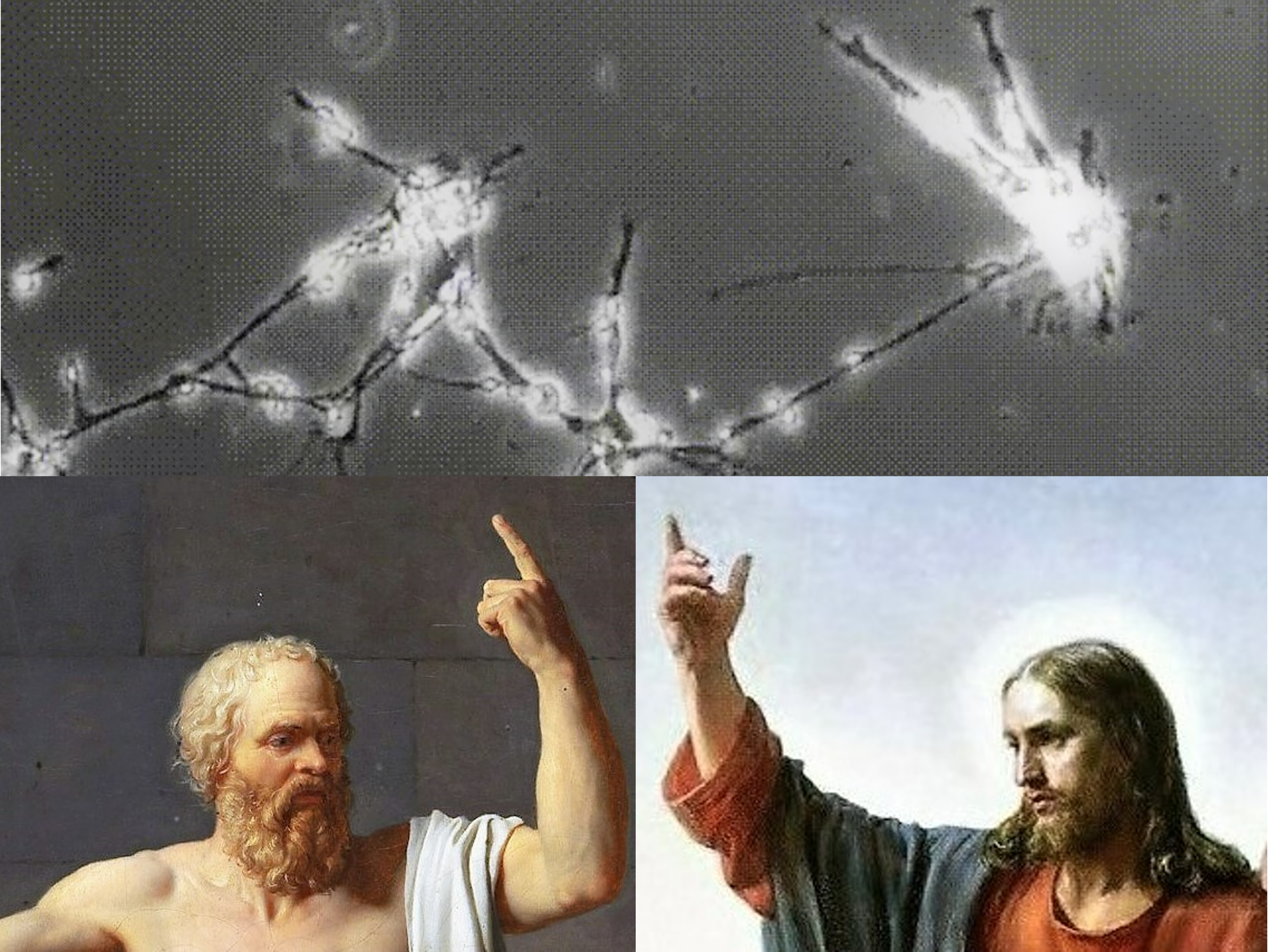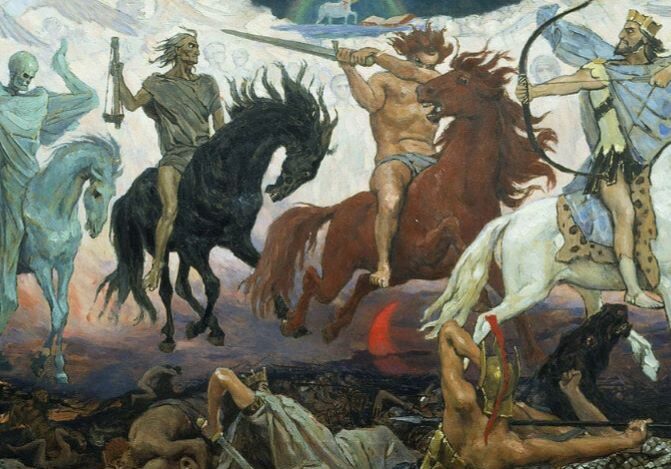Narrative and Metaverse
Part 1: The Living Word

Horatio: O day and night, but this is wondrous strange!
Hamlet: And therefore as a stranger give it welcome.
There are more things in heaven and earth, Horatio,
Than are dreamt of in your philosophy.
I've spent a thirty-five year professional career spanning academia, technology companies, and Wall Street studying "linguistic patterns in unstructured data" ... or what are more commonly known as narratives. After all these years of probing this invisible world of stories and memes and scripts and tropes and archetypes, I've come to an inescapable conclusion that excites me to no end and also scares the hell out of me.
Narratives are as real and as alive as you and me.
When I say that narratives are alive, I don't mean this as a metaphor. I truly believe that narratives are an alien lifeform in exactly the same way that viruses are an alien lifeform. Neither is directly observable or easily comprehensible within the human-scale macroverse - the familiar world of Newtonian physics and multicellular DNA-based organisms where all us humans, past, present and future, live out our lives. But there are more things in heaven and earth, Horatio, than are dreamt of in the macroverse.
Both narratives and viruses have a lifecycle of purpose and intention - they are born, they grow, they respond to their environment, they reproduce and they die - all in service to preserving the existence of their kind. Both can be organized and understood through the same principles of species taxonomy as any organism in the macroverse, and both are subject at the species level to the same forces of natural selection as any species in the macroverse. We can't see them. We can't hear them. We can't feel them. They are not even made of the same building blocks as you and me. But I tell you that both narratives and viruses are alive, each a dominant lifeform within its respective world.
The world of viruses is the microverse, an invisible and completely alien world of infinitesimal scale.
A note on the use of the word 'alien' here, which is the most ruined word in the English language. We've turned the word into a joke, into the common usage for little green men or anthropomorphic 'alien races' that are non-human mostly by declaration, but in truth are intensely human and perfectly familiar to us in intentionality and behavior. The only science fiction writer today who gets close to preserving the true meaning of the word - and I am convinced it's because he doesn't write in English - is Liu Cixin.
When I use the word 'alien', I mean it in its true sense. I mean it as something that is profoundly non-comprehensible on its own terms, that is - like the microverse - only comprehensible through the use of human-scaled and macroverse-familiar objects like bouncy balls and suction cups and bright colors and hunter/prey animations.

No one believed in the microverse 200 years ago. Germ theory wasn't even a thing. We had no words for a 'virus', and everyone in the world would have looked at you funny if you had said that these infinitesimally small packages of nucleic acid were real and alive. But today we all believe in germ theory. Today we all believe that viruses are real and alive, albeit in a truly alien way and within a truly alien world that no human has ever directly felt, heard, smelled, tasted or seen.
I'm asking you to give the same consideration to narratives. I'm asking you to allow for the possibility that there is another alien world besides the microverse, an alien world where narratives are born, grow, respond to their environment, reproduce and die. Where narratives are real and alive, albeit in a truly alien way and within a truly alien world that no human has ever directly felt, heard, smelled, tasted or seen.











They say only poets and comics get closest to the truth. I would add scientists, philosophers, theologians and perhaps a financial twitter writer…
Thank you Ben for expanding mankind’s metaphors in search of that truth…
This is the water in which I have been immersed in my whole life.
Jim Handshaw
“For my soul delighteth in the song of the heart; yea, the song of the righteous is a prayer unto me, and it shall be answered with a blessing upon their heads.”
From one swimmer to another, thank you, Jim!
This feels like a massive crescendo in the work of Epsilon theory hitting at the core of the message you’ve attuned us all to.
Something I noticed - if narratives are “real,” and you’ve convinced me they are, then “fiat news, currency, etc” and the “common knowledge” it helps bolster is the same kind of “real.” The word “fiat” has negative connotations and rightfully so since those narratives serve someone else’s cause at the unsuspecting’s expense. But the fiat world IS the real world if the narrative world is the real world.
So what separates the “fiat” narrative and the “clear eyes” narrative? Good and bad aren’t the right classifications.
In Sapiens, Harari goes on to give examples of how narratives win: “People are equal, not because Thomas Jefferson said so, but because God created them that way.”
The winning narratives appeal to a higher power - God or nature. If I have one critique of your work (and it’s really from my ecclesiastical wife) it’s that you’re missing the higher power part. I know why - b/c Wallstreet, like the USMC, does not use those words. Rusty keeps you grounded there sometimes, but he has been swimming in the same waters.
The good news? The message of Jesus that you’ve highlighted fits squarely in a higher power narrative we’re all familiar with. So maybe those with the language - non-finance types, non-Marine types, and definitely not both like me - can pick it up and run with it.
In any case, this piece is brilliant and I can’t wait for parts 2 and 3. Keep up the amazing work!
Your note made my day, Justin. Thank you! And yes, “fiat world” IS the real world. This was Orwell’s big insight, and it’s as spot-on today as it was in 1949!
Glad to hear it, Ben! Keep on “fiat-ing” the full-hearted world. I’ll do my best to keep doing the same.
There’s an essay written by Cormac McCarthy (oddly enough) about the origins of language: https://nautil.us/issue/47/consciousness/the-kekul-problem
He argues that language is entirely a constructed phenomenon, constructed by us, that it is not at all evolutionary. So, in relation to this piece, the fundamental idea that the tool of language actually alters the physical structures of the brain is a profound revelation. How did humans think before we had language? Once you start thinking like this it becomes apparent that how we receive the world through our senses is inherited, that the very way we think about the world is defined by the tools we use to interpret and communicate.
The revolutionary idea embedded in the message of the Gospels which you mention is made clear in what must’ve been a shocking parable at the time: the Parable of the Good Samaritan - Luke 10:25-37.
You should love your neighbor as yourself, but who is your neighbor? The parable relates the familiar story of an injured traveler being helped by an unrelated stranger, and contends that your neighbor is not a person of the same creed, race, ethnicity, family, tribe, or a person who resides in the same locality as you, your neighbor is “He that shewed mercy on [the injured traveler].”
Christianity, in this way, challenges all the narratives that held together the Roman Empire (and perhaps all social and political structures of the time). People can be united by an idea (or belief) instead of the accidents of birth.
The 19th century was the wellspring of the ideas that govern much of the modern world, and I keep thinking, “why is that?” I think it stems from the scientific refutation of the literal truth of the Bible and the slow liberation from physical poverty. When people stopped accepting the received truth about the nature of the universe, it left us exposed to an ocean of existential uncertainties. If there is no supreme deity, then what is the basis for morality? If there is no divine right of Kings, where does social authority derive from? If the Earth is actually billions of years old, what created it? If humans are just another animal which evolved, how are we special?
When we think to the past, particularly before the 19th century, it should be evident now that people were actually different than they are now. The received truth of the world was different for them, their brains were structured differently, their thoughts coalesced differently. When we observe the thoughts of the Ancient Romans for instance, say, the stoicism of Marcus Aurelius, we should understand that his conception of society was entirely different from our own.
I think the view you advocate here should free us from a type of determinism which restricts us to conceptions of narrow futures that are mere additions to what we believe now. Radical reconstruction of how we think about the world can fundamentally change human society, and this, as you say, has happened many times before.
I’m just restating your argument here for the most part, but I think this is a revelatory and powerful way to observe the world!
Thanks, Eric! Honestly, it was a personally revelatory experience to write this note. To use another biblical reference, I felt like the scales fell from my eyes.
Ben, just a really really fantastic note! Thank you
Oh gee…
I suspected Ben was building up to something “big” but I didn’t realise it was this big. I can’t stop reading certain passages and discovering a different dimension each time I do.
I’m not sure how your mind stumbled on this concept Ben but I like to imagine it was something like this:
“Drawing analogies between (the) virus and narratives is a neat idea…now I’m thinking about this, the similarities between the two are uncanny…its almost like narratives are real in the same way that (the) virus is real, but impossible to directly observe…wait a minute…oh god, that’s it” (sound of scales hitting the floor).
I think this kind of revelation only happens when a singular mind devotes a life time to contemplating an unfathomably deep concept. My thanks.
Can’t wait to see the next installment.